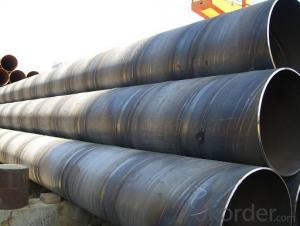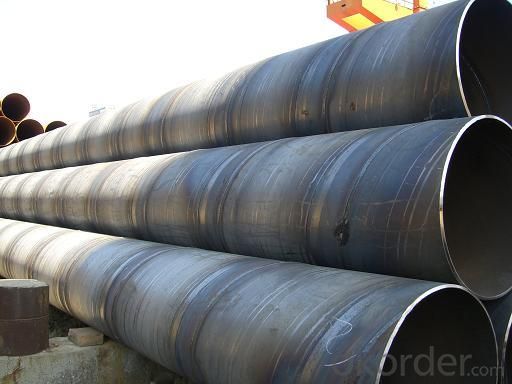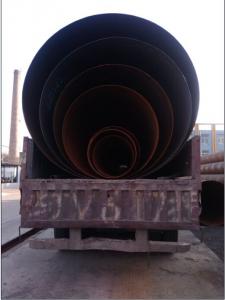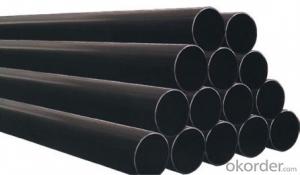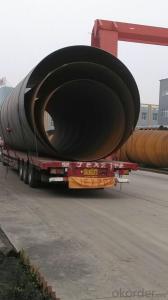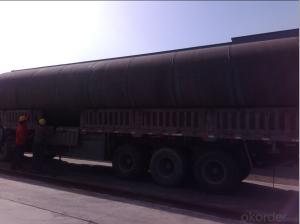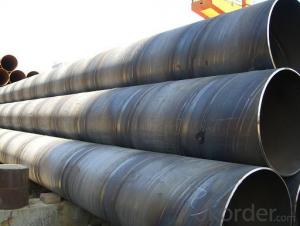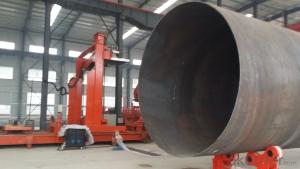58'' CARBON STEEL SSAW WELDED PIPE API/ASTM/JIS/DIN
- Loading Port:
- Tianjin
- Payment Terms:
- TT OR LC
- Min Order Qty:
- 5 m.t
- Supply Capability:
- 300 m.t/month
OKorder Service Pledge
OKorder Financial Service
You Might Also Like
Packaging & Delivery
Packaging Detail: | standard export packing or as customer's requirement |
Delivery Detail: | within 10 - 30 days |
Specifications
Spiral Welded Steel Pipes and Tubes
1.Material:Q195-Q235
2.Length:1-12m
3.WT:1.0-14mm
4.O.D.:20-273mm
Product Description:
1.Material : Q235,Q345,L245,L290,L360,L415,L450,L485,GrB,X42,46,X52,X56,X60,X65,X70,X80,X100
2,Standard: SY/T5037-2000,GB/T9711-2011,API Spec 5L PSL1/PSL2,ASTM A252\A53,ISO3183,DIN17172,EN10217,JIS G3457,AWWA C200,ASTM A139,ASTM A671,ASTM A672
3.Wall thickness: 3.0mm-30mm
4.Outer diameter: φ168mm-3020mm
5,Length: 5m-12m or as your requirement
6,Corrosion protection standard: DIN30670,DIN30671, AWWAC210, AWWA C203, SY/T0413-2002,SY/T0414-2002
7,Application: Oil, gas, natural gas, water pipe, thermal electricity pipe, steel structure engineering, etc
Q195-q345 Material Steel Pipe's Materials
Elements | Chemical Compsition% | Mechanical Property | ||||||
C% | Mn% | S% | P% | Si% | Yield Point (Mpa) | Tensile Strength(Mpa) | Elongation | |
Q195 | 0.06-0.12 | 0.25-0.50 | <0.050< span=""> | <0.045< span=""> | <0.030< span=""> | >195 | 315-430 | 32-33 |
Q215 | 0.09-0.15 | 0.25-0.55 | <0.05< span=""> | <0.045< span=""> | <0.030< span=""> | >215 | 335-450 | 26-31 |
Q235 | 0.12-0.20 | 0.30-0.70 | <0.045< span=""> | <0.045< span=""> | <0.030< span=""> | >235 | 375-500 | 24-26 |
Q345 | <0.20< span=""> | 1.0-1.6 | <0.040< span=""> | <0.040< span=""> | <0.55< span=""> | >345 | 470-630 | 21-22 |
Packaging & Delivery
Packaging Detail: | Normal exporting packing,in container or bulk vessel or as per clients' request |
Delivery Detail: | 2 months after confimed contract |
Specifications
Large Diameter API 5L X70 PSL2 LSAW Steel Pipe
Grade: X42, X46, X50, X52, X60, B, C
OD: 1.5"-28"
WT: SCH10-SCH160
Brand:TPCO
Large Diameter API 5L X70 PSL2 LSAW Steel Pipe
Specifications:
u Standard: API 5L
u Grade: B, C, X42, X46, X50, X52, X56, X60, X65, X70, X80
u OD: 1.5"-28"
u WT: SCH10-SCH160
u Length: 5-12m
u Ends Finish: plain end, bevel end, grooved end
u Surface Treatment: bare, black varnished, oiled finish, red color, anti-corrosion, 3PE, FBE or epoxy coating
u Technique: hot rolled or cold drawn
u Application: api 5l steel pipe for conveying oil, water, gas
u Invoicing: based on theoretical weight or actual weight
u Payment Terms: L/C at sight, T/T or Western Union
u Trade Terms: FOB, CFR, CIF
u Certification: ABS manufacturing assessment, ABS design assessment, API 5CT, API 5L, DNV manufacturer certificate, ISO9001 quality management system certificate, ISO14001 environment management system certificate, GB/T28001 occupational health and safety management system certificate, A1 class manufacturing license of special equipment certificate, CCS, GL, LR, SGS, TüV, PDE
- Q: How are steel pipes threaded for connection?
- Steel pipes are threaded for connection using a process called threading, which involves cutting helical grooves into the pipe's surface. This is typically done using a machine called a pipe threading machine, which rotates the pipe while a cutting tool is held against it, creating the desired threading pattern. The threaded ends of the pipes can then be connected using fittings or couplings to create a secure and leak-proof joint.
- Q: Can steel pipes be used for natural gas distribution?
- Yes, steel pipes can be used for natural gas distribution. Steel pipes are commonly used in natural gas distribution systems due to their high strength, durability, and resistance to corrosion. They can safely transport natural gas over long distances and are widely accepted in the industry for this purpose.
- Q: What are the factors affecting the cost of steel pipes?
- The factors affecting the cost of steel pipes include the price of raw materials such as iron ore and coal, the cost of energy and transportation, market demand and supply dynamics, currency exchange rates, manufacturing and labor costs, and any additional taxes or tariffs imposed on steel imports. Other factors may include technological advancements, regulatory compliance, and the overall economic conditions of producing countries.
- Q: How are steel pipes used in the construction of railways and transportation systems?
- Steel pipes are commonly used in the construction of railways and transportation systems for various purposes. One major use of steel pipes in these applications is for the construction of bridges and tunnels. Steel pipes are often used as structural components in the construction of bridges, providing support and stability to the overall structure. In tunnels, steel pipes are used as ventilation shafts, allowing for the circulation of air and removal of fumes, thus ensuring the safety of passengers and workers. Additionally, steel pipes are used for the construction of railway tracks. They are used as supports for the tracks, providing a stable base for the trains to travel on. Steel pipes used in railway tracks are typically coated or galvanized to protect them from corrosion and ensure their longevity. Moreover, steel pipes are used for drainage systems in railway stations and transport hubs, ensuring proper water management and preventing flooding. Another important application of steel pipes in transportation systems is for the construction of signposts and streetlights. Steel pipes are often used as the main structural element in these structures, providing strength and durability. They can be easily fabricated and shaped to meet the specific design requirements, making them a popular choice for these applications. Overall, steel pipes play a crucial role in the construction of railways and transportation systems by providing structural support, ensuring proper ventilation, facilitating drainage, and serving as the main components in various structures. Their strength, durability, and versatility make them an ideal choice for these applications, contributing to the safe and efficient operation of transportation networks.
- Q: What is the role of steel pipes in the transportation of water?
- The role of steel pipes in the transportation of water is to provide a durable and reliable infrastructure for the safe and efficient conveyance of water from its source to various destinations. Steel pipes are known for their strength, corrosion resistance, and ability to withstand high pressure, making them ideal for water transportation systems. These pipes ensure that water is delivered to homes, businesses, and other locations, while maintaining its quality and preventing leaks or contamination.
- Q: What are the different types of steel pipe end connections?
- There are several types of steel pipe end connections, including threaded, socket weld, butt weld, flanged, and grooved connections.
- Q: How do steel pipes withstand high pressure and temperature?
- The inherent properties and construction of steel pipes enable them to endure high pressure and temperature. Steel's strength and durability make it an ideal material for demanding applications. To begin with, steel pipes are crafted from top-notch steel alloys specifically engineered to withstand harsh conditions. These alloys are selected for their high tensile strength, enabling the pipes to withstand the internal pressure exerted by fluids or gases flowing through them. Often, steel used in these pipes is alloyed with elements like chromium, molybdenum, or nickel to enhance its resistance to corrosion and high temperatures. Furthermore, the construction of steel pipes plays a vital role in their ability to withstand high pressure and temperature. Typically, steel pipes are manufactured through seamless or welded processes. Seamless pipes are made by piercing a solid steel billet, resulting in a continuous and uniform pipe without any seams or joints. This seamless construction eradicates weak points and guarantees that the pipe can handle high pressure with no risk of leakage. On the other hand, welded pipes are created by joining two or more pieces of steel together using a welding process. The welds are meticulously inspected and tested to ensure their integrity and strength. Although welded pipes may have seams, they possess equal capability to endure high pressure and temperature when manufactured according to the appropriate standards. Additionally, steel pipes can be further fortified to enhance their resistance to pressure and temperature. For example, pipes used in extremely high-pressure applications may have increased thickness or additional layers of protective coatings. These measures bolster the strength and durability of the pipes, enabling them to withstand even higher pressures and temperatures. In conclusion, steel pipes can endure high pressure and temperature due to the robustness and longevity of the steel alloys used in their construction. The seamless or welded construction of these pipes eliminates weak points and guarantees their ability to handle extreme conditions. Additional reinforcement and protective coatings can be applied to further enhance their resistance to pressure and temperature.
- Q: Can steel pipes be used for conveying solid materials?
- Yes, steel pipes can be used for conveying solid materials. Steel pipes are commonly used in industries such as construction, oil and gas, and mining to transport solid materials such as ores, coal, grains, and various other solid substances. The durability and strength of steel make it suitable for handling the weight and pressure of solid materials during transportation.
- Q: What is the difference between schedule 10 and schedule 40 steel pipes?
- Schedule 10 and schedule 40 steel pipes are both commonly used in various industries for different purposes. The main difference lies in their wall thickness and pressure ratings. Schedule 10 steel pipes have a thinner wall compared to schedule 40 pipes. This means that schedule 10 pipes have a smaller internal diameter and can handle less pressure compared to schedule 40 pipes. The wall thickness of schedule 10 pipes is typically 0.109 inches, while schedule 40 pipes have a wall thickness of 0.154 inches. Due to their thinner walls, schedule 10 pipes are primarily used for low-pressure applications such as domestic water supply, drainage systems, and general plumbing. They are also commonly used for lightweight structures or where weight is a concern. On the other hand, schedule 40 pipes are designed to handle higher pressure and are often used in industrial applications, including oil and gas pipelines, chemical processing plants, and high-pressure fluid systems. The thicker walls of schedule 40 pipes provide them with increased strength and durability to withstand higher pressure and stress. In summary, the main difference between schedule 10 and schedule 40 steel pipes is their wall thickness and pressure ratings. Schedule 10 pipes have a thinner wall and are suitable for low-pressure applications, while schedule 40 pipes have a thicker wall and can handle higher pressure. It is important to choose the appropriate schedule based on the specific requirements and pressure limitations of the intended application.
- Q: How are steel pipes connected to other materials like concrete or plastic?
- Steel pipes are commonly connected to other materials like concrete or plastic through various methods. One common method is through the use of fittings. Fittings are specialized components that facilitate the connection between different materials or pipe sections. These fittings come in various shapes and sizes, such as elbows, tees, reducers, and couplings, and they are designed to provide a secure and leak-proof connection. When connecting steel pipes to concrete, one method is to use concrete anchors. These anchors are embedded into the concrete structure and provide a stable base for securing the steel pipe. The pipe is then attached to the anchor using clamps or brackets. Connecting steel pipes to plastic materials can be achieved through the use of transition fittings. These fittings are specifically designed to join steel pipes with plastic pipes. They typically feature different connection mechanisms on each end, such as threads or compression fittings, allowing for a secure and reliable connection. In some cases, steel pipes can also be connected to other materials using welding techniques. Welding involves melting the ends of the steel and the other material together to create a strong joint. This method is often used for connecting steel pipes to steel structures or components. Overall, the connection of steel pipes to other materials like concrete or plastic requires the use of specialized fittings, anchors, or welding techniques. These methods ensure that the connection is secure, durable, and able to withstand the demands of the application.
Send your message to us
58'' CARBON STEEL SSAW WELDED PIPE API/ASTM/JIS/DIN
- Loading Port:
- Tianjin
- Payment Terms:
- TT OR LC
- Min Order Qty:
- 5 m.t
- Supply Capability:
- 300 m.t/month
OKorder Service Pledge
OKorder Financial Service
Similar products
Hot products
Hot Searches
Related keywords
